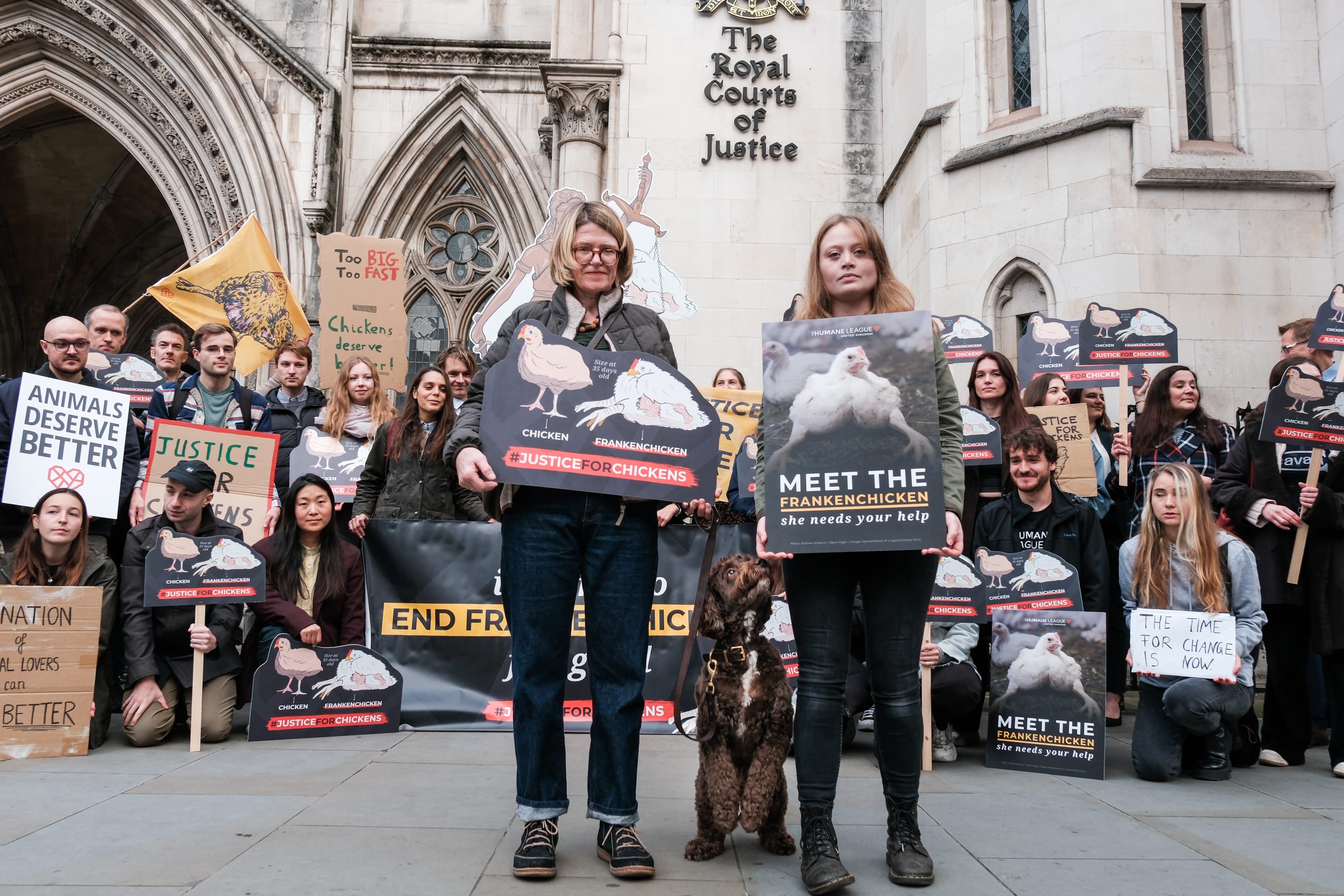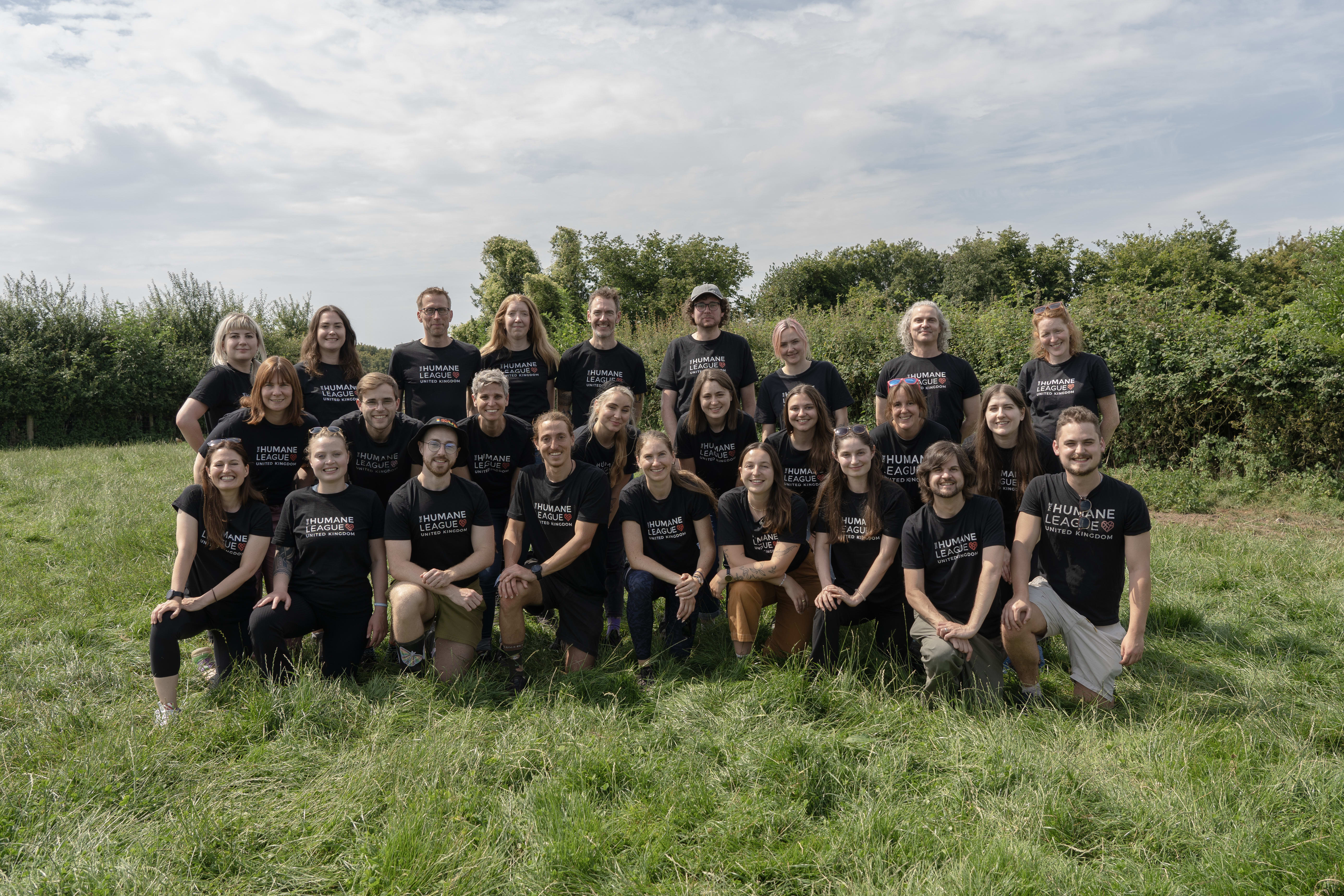Our end of year match giving appeal is live. You can now donate to help us raise our target before December 3rd.
UPDATE 29th November, 5:22pm: Our generous match funders have increased funding from £40,000 to £50,000. This means all individual donations up to a total of £50,000 will be doubled, unlocking even more impact potential to reduce suffering.
In the spirit of “Marginal Funding Week” for the 2024 Giving Season on the EA Forum, we’d like to share with you THL UK’s need for additional funding, what we would do with it, and how you can have a real impact on reducing the suffering of animals raised for food.
We’re currently seeking funding for our match giving appeal. We’re hoping to raise a total of £80,000 to help us achieve our goals and continue fighting for animals long into the future.
Structure of the post:
- Our situation
- How we would use extra funding
- Our match giving appeal
- Why give to THL UK
- Conclusion
Our situation
We’re facing a funding gap of £236k this year and seek long-term funding to continue our work and give us greater financial stability.
We currently receive an annual grant from THL (an independent non-profit registered in the United States) which we plan to reduce next financial year as part of our long-term plan towards greater financial self-reliance. As such, we need to grow our UK supporter base, diversify our income streams, and secure longer-term funding. We also need to make sure we cover the shortfall not covered by our grant from THL.
If we do not receive the funding budgeted for our work, we would need to either scale back some of our activities or draw on our reserves. Therefore, we are reliant on donations during our match giving appeal, and in the future months, to ensure activities go ahead as planned and the long-term financial health of THL UK.
How we would use extra funding
At the heart of how we’d use marginal funding is our ongoing fight against the suffering of Frankenchickens. Across the UK, more than 90% of chickens raised for food are fast-growing breeds. These chickens have been bred to grow at such an unnatural rate that their bodies can’t support the weight, leading to pain, immobility, and unimaginable suffering for millions of animals.
Although all chickens suffer from factory farming, reports by RSPCA and the Welfare Footprint Project have shown that most welfare offenses experienced by broilers are caused by their unnatural growth rate. For slower-growing breeds, similar health problems are experienced, but generally with a much later onset, thus, they suffer for a shorter period of time before slaughter.
Although we’re campaigning relentlessly to stop farmed animal suffering, the problem is vast, with over 1.2 billion animals slaughtered every year. Marginal funding would be directed towards our campaigns to end suffering for farmed animals, particularly Frankenchickens.
We’re waiting on a verdict:
In October, THL UK went to court, represented by law firm Advocates for Animals, to argue against rearing fast-growing chicken breeds. We’re now waiting for a verdict and the outcome could change the course of our work.
If we do not win our appeal, we will explore our options per our strategic plans. This will likely include putting additional resources into our most successful tactic- applying pressure on corporations to sign up to the Better Chicken Commitment. Our corporate campaigning work brings real and measurable changes to the poultry sector, however, we face a £3 billion industry and our resources are limited.
Should we be successful with the appeal, there will be further action to make sure that Defra fulfills any obligations assigned as per a court order. This will cost time and money. Additionally, we will still need to work with companies to fulfill Better Chicken Commitment principles around stocking density and living conditions.
Whatever the verdict, we must be prepared to face a mountainous challenge. Marginal funding will help us secure a better future for farmed animals and, ultimately, more funding equates to more lives changed for the better.

Our 2024 match giving appeal
To help us fund our vital work for farmed animals, we will be running a match giving appeal to raise £80,000.
Between 25th November and 3rd December, donations made to THL UK will be matched by two generous donors who are each offering £20,000. This is the first time either of the donors has offered match funding and for one donor it is the biggest gift they have made to THL UK.
As our largest fundraising campaign of the year, our match giving appeal offers an unrivaled opportunity to close our funding gap and double the impact of your donations. Ultimately, the work we can do for Frankenchickens relies on the success of this campaign.
Every gift received matters profoundly: we are committed to a ‘true match’, meaning our funders match only the donations we receive.
You can donate to our appeal in two ways:
- By making a one-off donation via our campaign page between the 25th November- 3rd December.
- By setting up a monthly donation during our campaign. For the first time, monthly gifts set up during the appeal will be eligible for match funding for the first 12 months. If you’re already a monthly donor, you take part in our match giving appeal by increasing your regular donation.
The easiest way to donate is via our dedicated online page between 25th November and 3rd December, the page is now live.
However, if you wish to give another way, or have any questions about donating, please contact Molly, Major Gifts Coordinator (marcherzeff@thehumaneleague.org.uk) or Gavin, Head of Development (gcbates@thehumaneleague.org.uk).
Why give to THL UK
- We know that our tactics work. We have a history of taking on the world’s largest food companies and winning. Not only have we achieved significant corporate commitments, over 60 cage-free commitments and 144 Better Chicken Commitments (BCC), but, thanks to our efforts to hold companies accountable, many commitments have now been fulfilled and companies are reporting on them - with 85% of cage-free commitments fulfilled to date and 24 companies publishing progress on the BCC.
- We focus on broiler chickens, hens and fishes as they are farmed in the largest numbers and have relatively few protections. The scale and the suffering these animals face mean we can have a significant impact through targeted and incremental welfare improvements.
- Our history of successes has not only directly impacted the lives of millions of animals in the UK, but has also helped lead the way for other animal welfare programmes across the globe. As well as focussing on our own domestic priorities, as part of the OWA, we are a key player in ensuring progress for animals in Europe and beyond. A donation to THL UK, therefore, has an impact on both domestic and international animals.
- Whilst we’re still a fairly young organisation, we have already achieved some big wins for the animals. This is one of the reasons why we, as part of THL, are recommended by Animal Charity Evaluators (ACE) as one of the most effective animal protection organisations in Europe and beyond.
- If you’re interested in our efforts to enshrine farmed animal welfare into UK policies and laws, then you may wish to consider giving directly to THL UK. Although we receive a significant annual grant from THL (an independent non-profit registered in the United States), the money is subject to U.S. laws regarding lobbying. As such, this funding from THL cannot be used for lobbying or legislative work, such as our case challenging the legality of fast-growing breeds of chicken and our lobbying work to introduce stunning laws for farmed fishes at the time of slaughter.
- Donating directly to THL UK may allow you to increase the value of your donation. If you are a UK-based donor then your gift may be eligible for Gift Aid, which can increase the value of your donation by 25%, maximising its impact.
Conclusion
THL UK needs your support to continue our current work for farmed animals. We are committed to making the biggest impact with every pound that is donated to support our mission but with such a tiny proportion of charitable donations going towards farmed animal welfare, our resources are limited. Marginal funding will ultimately ensure that we can continue our vital work to end the suffering of farmed animals, particularly focusing on the welfare of chickens and fishes. With so many animals suffering in factory farming systems at this very moment, our work is urgent. Every pound you donate helps to improve lives.

The Humane League UK is a registered charity in England and Wales working to end the abuse of animals raised for food.
Whilst we’re still a fairly young organisation, we have already achieved some big wins for the animals. This is one of the reasons why we, as part of THL, are recommended by Animal Charity Evaluators (ACE) as one of the most effective animal protection organisations in the world.
THL is the only organisation to have been recommended every year in the history of ACE’s reviews. Their continued endorsement underscores our effectiveness and commitment to creating a better world for animals. They have evaluated us to be an ‘exceptional’ example of effective advocacy:
‘Giving to THL is an excellent opportunity to support initiatives that create the most positive change for animals.’
Our vision is that by 2050, we've stopped the worst and most widespread abuse of animals raised for food, and they’re treated with far greater compassion.

Our end of year match giving appeal is live. You can now donate to help us raise £80,000 before December 3rd.